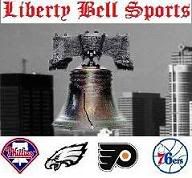One dazzled people with his play on the field. The other dazzled them with his amazing voice. But what made them so special was their friendship and team work in the broadcast booth years after the former retired. Richie Ashburn and Harry Kalas were two of the greatest broadcasting duos in all of sports and captured so many hearts in Philadelphia. Moment #9 will be when they died at their respective ages.
Ashburn was as smooth in the box as he was in center field when he played in the 40's and 50's. When I look back at baseball history, there are a few players who I would love to have seen play. Sure I want to see Babe Ruth, Micky Mantle, Willie Mays or Joe DiMaggio but when it comes to watching a Phillie play, Ashburn is the type of player I want to see. He could hit, play defense, steal bases, and just simply hustle.
In 1963, Ashburn worked along side By Saam in the broadcast booth. In 1971, Kalas joined the duo and when Saam retired in 1976, "Harry and Whitey" would broadcast together for 21 more years. Ashburn had the honor of being inducted into the baseball Hall of Fame in Cooperstown in 1995 for his service to baseball on and off the field. Ashburn planned on retiring after the 1997 season but suddenly died of a heart attack after a Mets/Phillies game. In honor of Ashburn, the center field pavillion in the new Citizens Bank Park was named "Ashburn Alley."
Kalas had to move on but could never stop grieving the death of his best friend. When he took over, he was joined by many guys including former pitcher and member of the 1993 team, Larry Anderson, Tom McCarthy, and Chris Wheeler. In 2008, Kalas was sideline for a few games due to a detached retina. Kalas was named to the baseball Hall of Fame in 2002.
Then on April 8, 2009, Kalas partook in the opening ceremonies in which the Phillies were handed their championship rings. It was his last home game. On April 13, he collapsed in the broadcast booth in Washington hours before the Phillies played the Nationals. He died 90 minutes later.
The city was hit so hard when Ashburn died and was hit even harder after Kalas passed. The city, not even through the 1964 collapse or Joe Carter's home run or anything the other 3 professional teams did hit the city like the deaths of our greatest voices. They were the voice of the Phillies and the voice of the city of Philadelphia. Now they're calling the Phillies games from the heavens.



0 Comments:
Post a Comment